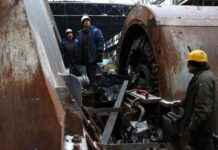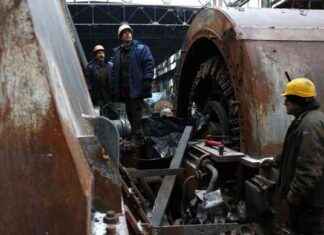two years ago, reported a long series of papers on the somewhat unlikely creation Frigid Farrah – a sexrobot with built-in resistors. Or ”våldtäktsläge”, as critics called it. Despite their very contemporary qualities of the bar of this news reporting on a timeless truth: other people’s obedience is, as a rule, only worth something if it is born out of something like a free will.
In the German playwright Georg His most famous work, unfinished at his death in 1837, it is a tragic man out of the precariat that is thrown around as a lifeless piece of humanoid. If the fragmentary ”Woyzeck” has a storyline, usually summed up as a powerless and poor soldier be subject to cruel experiments, and be deceived by his sweetheart, who he then murders. The question is: at what level of avhumanisering, it ends up owning your own will and your own morals?
make that each director can, and perhaps must, make my very own ”Woyzeck”; when Michael Thalheimer put up a brutal and meaty interpretation at the royal dramatic theatre in 2013 was Woyzeck to the desperate mass murderer in Erik Ehns formidable design. At the Helsingborg city theatre is Woyzeck not even on the scene. This is ”Woyzeck” in the same way as theatre Productions, playing ”Hamlet” – a new play with the crackling wires into the original.
Erik holmström’s interpretation played four roles with associated porträttlika dolls around our tragic figure and try to define who he, or she, is. A substitute might, or employee, in a workplace where all power relations are ostensibly dissolved and that which is bought and sold is not your labor, but your motivated personality – as long as the demand is there.
the Scene where a nameless boss during an appraisal says that she sometimes can experience that Woyzeck just ”go to work” is brilliant in its portrayal of a late-capitalism that requires obedience into the human emotions. When Woyzeck gets fired, it does so in terms that they should ”be their own boss” and to meet ”new challenges”.
playwright Tom Silkeberg and a hard-working quartet (Gustav Berg, Cecilia Borssén, Emma Mehonic and Robert Olofsson) created a kind of simulated improvisational theater, without the traditional dramaturgical conflicts. The actors build a world around Woyzeck, by proposing scenes and affirm each other in all an almost maniacal and ritualistic way, in a play full of comedic and existential charged parts.
the Risk with this flowing technique is that the game is without the core and friction, which also partly takes place here. It is also a shame that He makes so little of the puppets on the stage, in a play that, more than anything, asking questions about will, morality and freedom of action.
the grip is thematically nicely in a set that effectively and closely depicts the post-modern workplace, where the boss refuses to be the parent, and thus hide the most central of the conflict. This is a Woyzeck that has been dissolved in a state, which we all more or less moving in.








